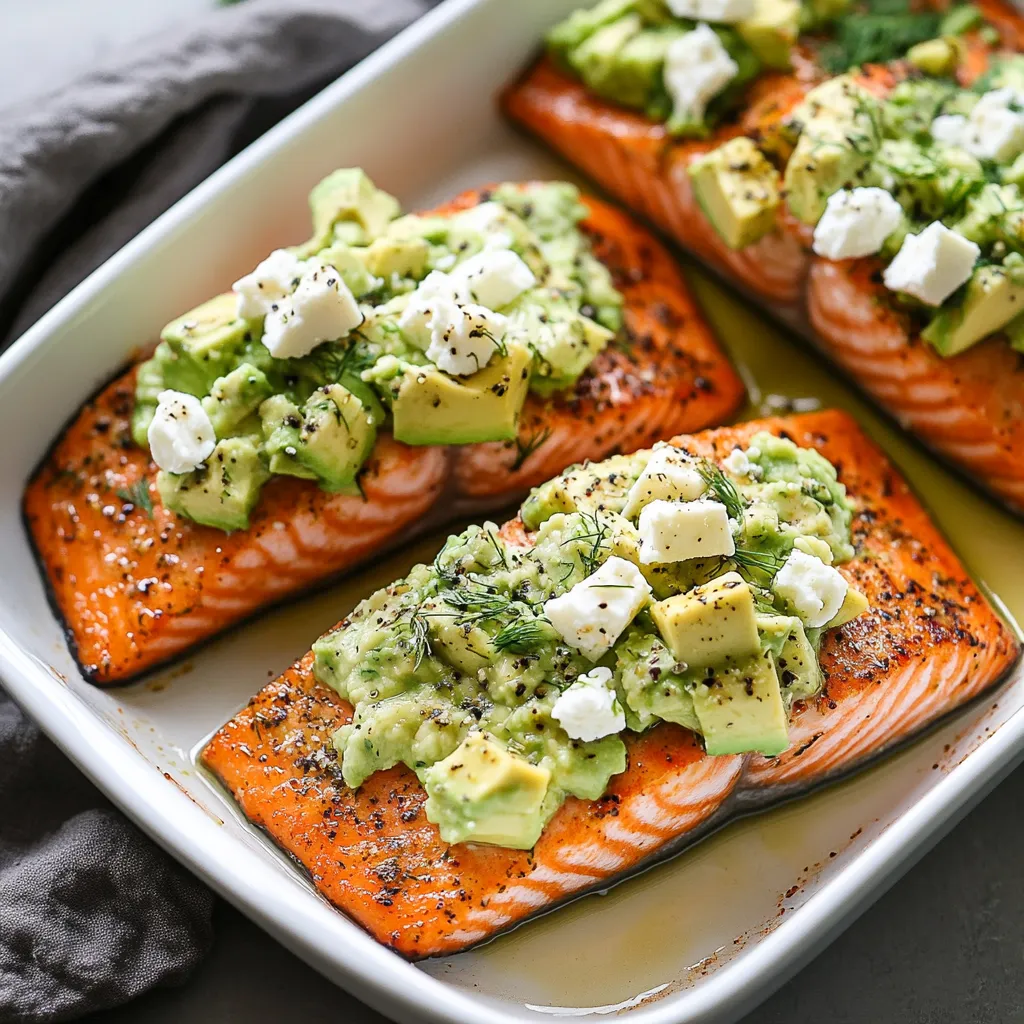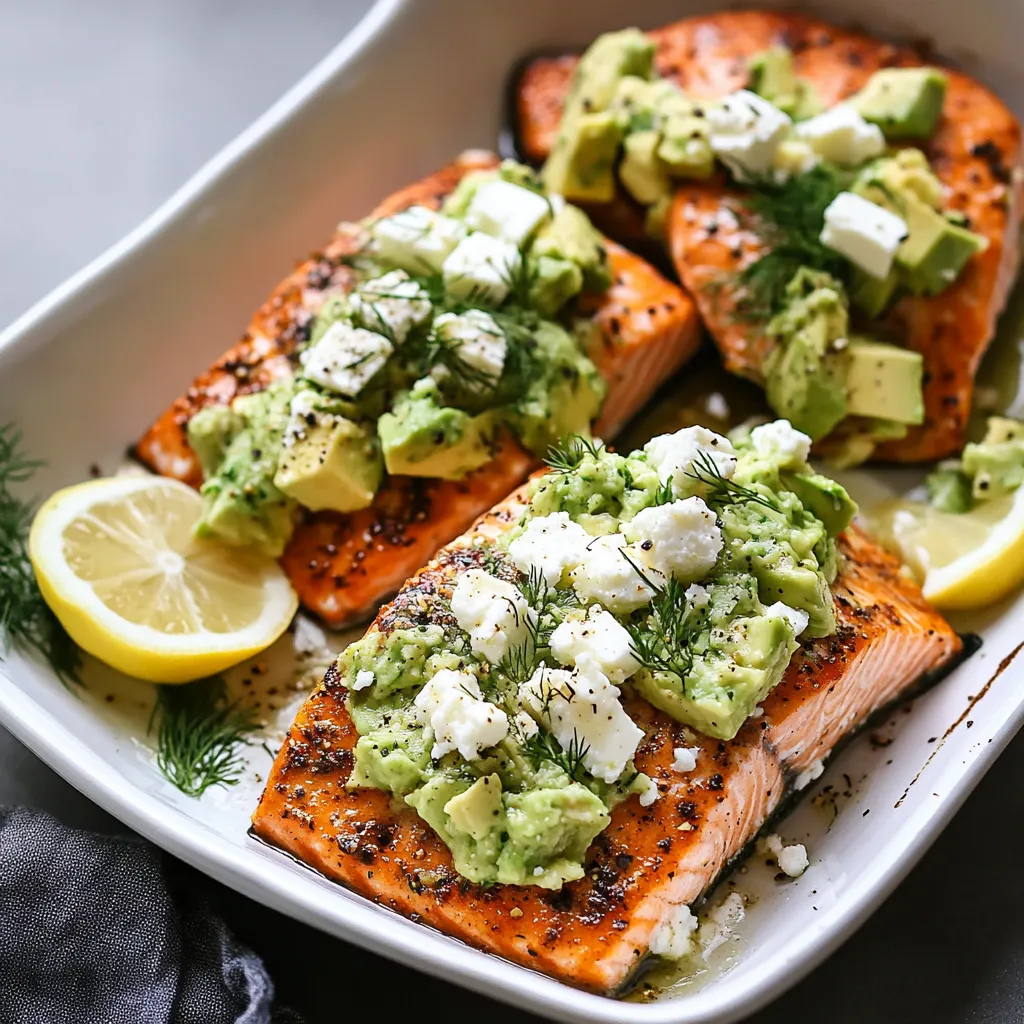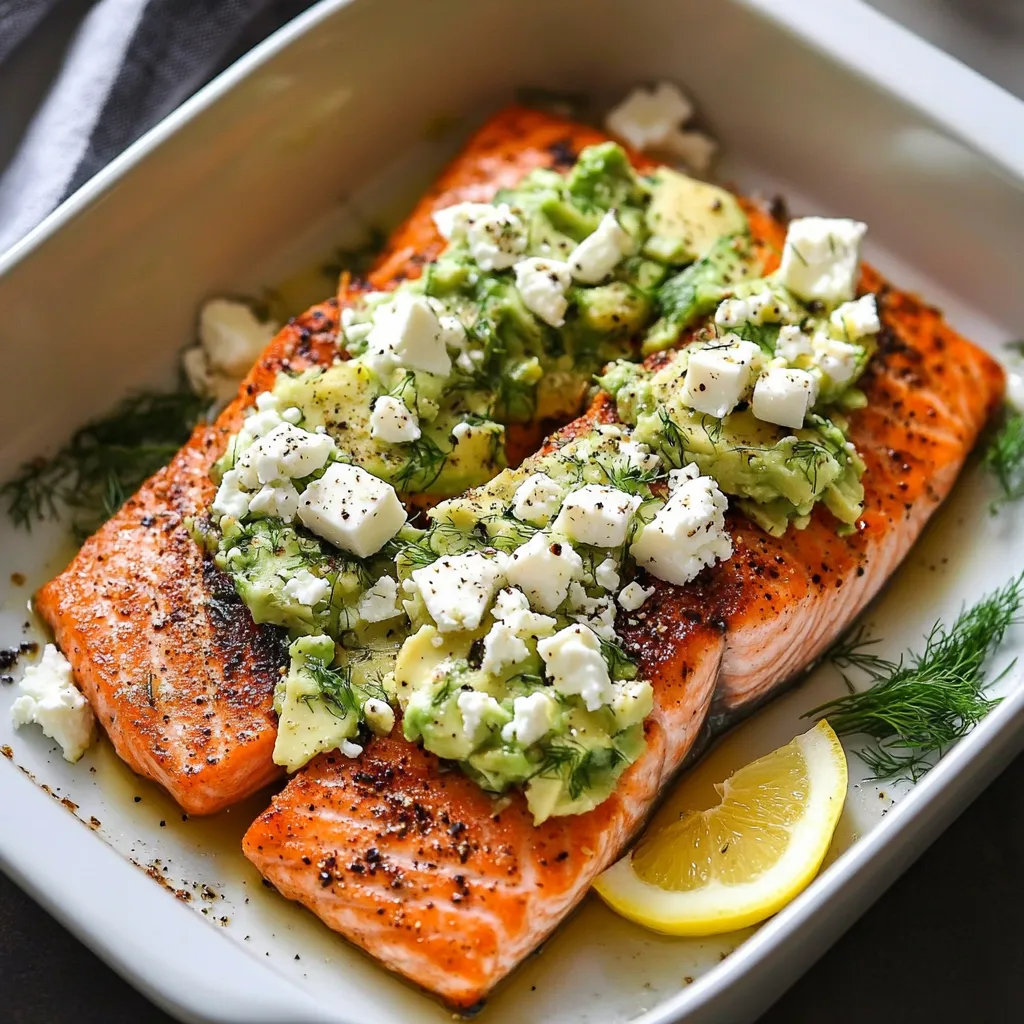 Pin it
Pin it
This succulent baked salmon with avocado and feta makes an impressive dinner that requires minimal effort. The flaky, tender salmon pairs perfectly with the creamy avocado and tangy feta topping, creating a harmonious blend of flavors and textures that will leave your taste buds dancing.
I first created this recipe when trying to impress my in-laws during their first visit to our home. The combination was such a hit that it's become our go-to entertaining dish when we want something elegant yet effortless.
Ingredients
- Salmon fillets without skin: Use fresh wild-caught salmon when possible for the best flavor and texture
- Olive oil: Use extra virgin for more robust flavor
- Lemon juice and zest: Adds brightness that cuts through the richness of the salmon
- Fresh dill: The feathery herb pairs perfectly with seafood and adds a subtle anise flavor
- Avocado: Choose one that yields slightly to gentle pressure for perfect ripeness
- Feta cheese: Traditional Greek feta made from sheep's milk offers the most authentic tang
- Fresh chives: Provide a mild onion flavor without overpowering the delicate fish
Step-by-Step Instructions
- Prep the Oven:
- Heat your oven to 400°F. This moderate temperature ensures the salmon cooks quickly while remaining moist. Spray your baking dish generously with non-stick cooking spray to prevent any sticking.
- Make the Topping:
- Combine the diced avocado, crumbled feta, chopped dill, and sliced chives in a small bowl. The avocado should be ripe but firm enough to hold its shape when diced. Squeeze fresh lemon juice over the mixture to prevent browning and enhance flavors. Season with salt and pepper, starting with just a pinch of each and adjusting to your preference. The feta already provides saltiness, so go easy at first.
- Prepare the Salmon:
- Pat each fillet thoroughly with paper towels. Removing surface moisture is crucial for proper browning. Arrange the fillets in your prepared baking dish with a little space between each piece. Whisk together the olive oil, lemon juice, lemon zest, and dill until well combined, then brush this flavorful mixture generously over each piece of salmon. The oil helps lock in moisture while the acidic lemon juice begins to tenderize the fish. Season each fillet with salt, pepper, and paprika to create a beautiful color and subtle smoky flavor.
- Bake the Salmon:
- Place the dish in your preheated oven and bake for 10-12 minutes. The exact time depends on the thickness of your fillets. For perfect doneness, look for salmon that flakes easily with a fork but still maintains a slightly translucent center. This ensures moist, tender results rather than dry, overcooked fish.
- Serve Immediately:
- Remove the salmon from the oven and plate while hot. Retrieve your chilled avocado-feta topping from the refrigerator and generously spoon it over each fillet. The contrast between the warm salmon and cool topping creates a delightful temperature variation.
 Pin it
Pin it
The fresh dill is truly the unsung hero of this dish. I grow it in my herb garden specifically for this recipe after discovering how dramatically it elevates the flavor profile. My daughter, who typically avoids seafood, always requests a second helping when I make this salmon. Something about the combination of the rich fish with the creamy avocado-feta mixture seems to convert even the most reluctant seafood eaters.
Make-Ahead Options
The avocado-feta topping can be prepared up to 4 hours in advance. The lemon juice helps prevent browning, but for best results, place plastic wrap directly on the surface of the mixture and refrigerate until ready to use. You can also prepare the salmon marinade the morning of serving. I often measure and combine the olive oil, lemon juice, zest, and dill in a small container, then store it in the refrigerator until dinner time. This makes the final preparation lightning-fast.
Perfect Pairings
This salmon shines alongside simple side dishes that complement without competing. A light quinoa pilaf with a touch of lemon zest echoes the citrus notes in the salmon. Roasted asparagus or a simple arugula salad dressed with olive oil and lemon juice makes for a complete meal. For a more substantial dinner, consider garlic roasted potatoes or wild rice. A chilled glass of Sauvignon Blanc or Pinot Grigio provides the ideal beverage pairing, cutting through the richness of the fish.
Ingredient Substitutions
No fresh dill available? Dried dill works in a pinch, though reduce the amount to one-third of what the recipe calls for. The topping is incredibly versatile. Goat cheese can replace feta for a creamier result, and cilantro can stand in for dill if you prefer a different flavor profile. For the salmon, this preparation method works beautifully with other fish like trout or arctic char. If avocados aren't perfectly ripe, you can substitute a simple Greek yogurt base mixed with the herbs and feta for a different but equally delicious topping.
 Pin it
Pin it
Frequently Asked Questions
- → How do I know when the salmon is fully cooked?
The salmon is done when it flakes easily with a fork and is no longer translucent in the center. This usually takes about 10-12 minutes at 400°F.
- → Can I use frozen salmon fillets?
Yes, but make sure to thaw the salmon completely and pat it dry before preparing and baking.
- → Can I make the avocado-feta topping ahead of time?
Yes, you can prepare the topping a few hours in advance. Cover and refrigerate until ready to use to keep it fresh.
- → What side dishes pair well with this dish?
It pairs well with roasted vegetables, a fresh green salad, quinoa, or steamed rice for a balanced meal.
- → Can I substitute feta cheese in the topping?
Absolutely! Goat cheese or even a light cream cheese can be substituted if desired.
- → Can I grill the salmon instead of baking?
Yes, grilling the salmon is a great alternative! Brush the fillets with the olive oil mixture and grill over medium heat until fully cooked.
